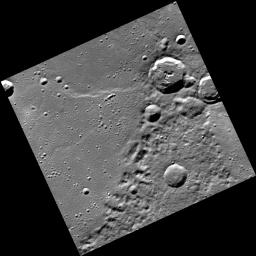The crater with the central peaks in the northeast portion of this image is located on the eastern rim of a large impact basin. Extending westward from this crater is a wrinkle ridge that may have formed due to contraction as lava that flooded the basin cooled. Scientists studying craters and large impact basins on Mercury learn more and more of the innermost planet's "secrets" as new imagery and data from MESSENGER become available.
This image was acquired as part of MDIS's high-resolution surface morphology base map. The surface morphology base map will cover more than 90% of Mercury's surface with an average resolution of 250 meters/pixel (0.16 miles/pixel or 820 feet/pixel). Images acquired for the surface morphology base map typically have off-vertical Sun angles (i.e., high incidence angles) and visible shadows so as to reveal clearly the topographic form of geologic features.
The MESSENGER spacecraft is the first ever to orbit the planet Mercury, and the spacecraft's seven scientific instruments and radio science investigation are unraveling the history and evolution of the Solar System's innermost planet. Visit the Why Mercury? section of this website to learn more about the key science
questions that the MESSENGER mission is addressing. During the one-year primary mission, MDIS is
scheduled to acquire more than 75,000 images in support of MESSENGER's science
goals.
Date acquired: July 13, 2011
Image Mission Elapsed Time (MET): 219011692
Image ID: 497387
Instrument: Wide Angle Camera (WAC) of the Mercury Dual Imaging System (MDIS)
WAC filter: 7 (748 nanometers)
Center Latitude: 69.75°
Center Longitude: 110.8° E
Resolution: 248 meters/pixel
Scale: Image diagonal is ~180 km (112 mi)
Incidence Angle: 71.3°
Emission Angle: 0.2°
Phase Angle: 71.4°
These images are from MESSENGER, a NASA Discovery mission to conduct the first orbital study of the innermost planet, Mercury. For information regarding the use of images, see the MESSENGER image use policy.

 Planetary Data System
Planetary Data System












